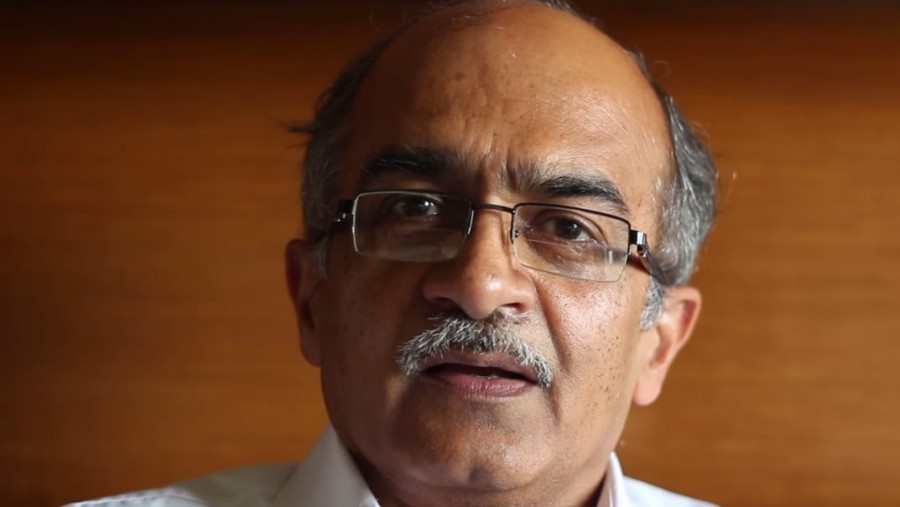Advocate Prashant Bhushan on Thursday invoked Mahatma Gandhi to tell the Supreme Court that he was not seeking “mercy” or “magnanimity” in the criminal contempt proceedings against him as he was neither a “courtier” nor a “cheerleader” but would “cheerfully submit to any penalty that can lawfully be inflicted”.
Bhushan, convicted of criminal contempt of court, said it would be “insincere and contemptuous on my part to offer an apology for the tweets that expressed what was and continues to be my bona fide belief”.
The bench of Justices Arun Mishra, B.R. Gavai and Krishna Murari gave Bhushan two to three days to reconsider his “defiant statement”. The maximum punishment for criminal contempt of court is six months’ imprisonment or a fine or both.
The bench had on August 14 convicted Bhushan of criminal contempt of court for two tweets.
During the “Great Trial” of 1922, Gandhi had used words similar to what Bhushan has paraphrased in his statement in court.
Gandhi had been arrested from the Sabarmati Ashram in March 1922 for certain articles published in the Young India newspaper and charged with “bringing or attempting to bring into hatred or contempt or exciting or attempting to excite disaffection towards His Majesty’s Government, established by law in British India”.
While pleading guilty to the charges, Gandhi had said: “I do not ask for mercy. I do not plead any extenuating act. I am here, therefore, to invite and cheerfully submit to the highest penalty that can be inflicted upon me for what in law is a deliberate crime and what appears to me to be the highest duty of a citizen.”
Judge C.N. Broomfield sentenced Gandhi to a cumulative six years in jail but added that “if the course of events in India should make it possible for the government to reduce the period and release you, no one will be better pleased than I”.
On Thursday, Bhushan, who has been held guilty of charges that the top court feels need dealing with “an iron hand”, said that expressing his “bona fide beliefs... must be permissible in any democracy”.
As senior advocates Rajeev Dhavan and Dushyant Dave were arguing on his behalf during the hearing, held via videoconferencing, Bhushan made the statement. The written statement was issued on Bhushan’s behalf by advocate Cherryl Dsouza.
Bhushan’s statement is reproduced below verbatim:
“I have gone through the judgment of this Hon’ble Court. I am pained that I have been held guilty of committing contempt of the court whose majesty I have tried to uphold — not as a courtier or cheerleader but as a humble guard — for over three decades, at some personal and professional cost.
“I am pained, not because I may be punished, but because I have been grossly misunderstood. I am shocked that the court holds me guilty of ‘malicious, scurrilous, calculated attack’ on the institution of administration of justice. I am dismayed that the court has arrived at this conclusion without providing any evidence of my motives to launch such an attack.
“I must confess that I am disappointed that the court did not find it necessary to serve me with a copy of the complaint on the basis of which the suo motu notice was issued, nor found it necessary to respond to the specific averments made by me in my reply affidavit or the many submissions of my counsel.
“I find it hard to believe that the court finds my tweet ‘has the effect of destabilising the very foundation of this important pillar of Indian democracy’. I can only reiterate that these two tweets represented my bona fide beliefs, the expression of which must be permissible in any democracy.
“Indeed, public scrutiny is desirable for healthy functioning of the judiciary itself. I believe that open criticism of any institution is necessary in a democracy, to safeguard the constitutional order.
“We are living through that moment in our history when higher principles must trump routine obligations, when saving the constitutional order must come before personal and professional niceties, when considerations of the present must not come in the way of discharging our responsibility towards the future.
“Failing to speak up would have been a dereliction of duty, especially for an officer of the court like myself. My tweets were nothing but a small attempt to discharge what I considered to be my highest duty at this juncture in the history of our republic. I did not tweet in a fit of absence mindedness.
“It would be insincere and contemptuous on my part to offer an apology for the tweets that expressed what was and continues to be my bona fide belief.
“Therefore, I can only humbly paraphrase what the Father of the Nation Mahatma Gandhi had said in his trial: I do not ask for mercy. I do not appeal to magnanimity. I am here, therefore, to cheerfully submit to any penalty that can lawfully be inflicted upon me for what the court has determined to be an offence, and what appears to me to be the highest duty of a citizen.”











